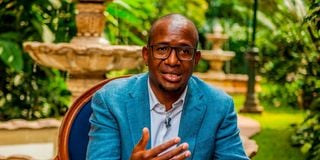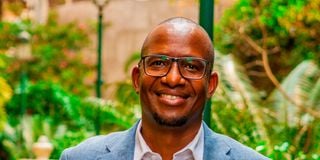Prime
Kenya's place in TikTok golden triangle project - VIDEO
Fortune Mgwili-Sibanda is technically the TikTok Africa boss, but for protocol reasons, his designation reads Director Public Policy and Government Relations for TikTok Africa.
He calls himself “a struggling golfer, a struggling cook, an occasional road runner, and a chess lover.” Mr Sibanda, 48, joined the technology industry when there was a lot of talk about new media technologies.
His Master’s degree thesis was on blogging. “Before I joined TikTok two years ago, I did many things. I’m a dinosaur,” he says of his career at the Highway Africa, the Gender and Media Network for Southern Africa, and then the Open Society Foundation for South Africa.
How would you describe your experience at TikTok so far?
It’s exciting and fast-paced. Working for TikTok is like the app itself, very vibe-y. It’s been two and a half years, but it feels like ten years because a lot is happening.
How significant is the Kenyan market for TikTok?
TikTok is still a small platform, but we are growing. We are just five years old. But there is a lot of room for growth, and Kenya is an area we want to develop.
There is a lot of talk about the next billion users going online, and most of those will come from markets such as Kenya.
How many Kenyan users do we have on TikTok?
I would love to give you the figure, but I don’t know. The one figure we have announced is that we hit one billion monthly active users globally. We don’t have those (Kenya-specific figures) currently, but we will release them soon.
Which is Africa’s biggest TikTok market?
In the continent, we are specifically focusing on South Africa, Kenya, and Nigeria. That’s where we see a lot of creativity.
This is not to say we are not present in other African countries, but in terms of the golden triangle, it’s Lagos, Nairobi, and Johannesburg. In North Africa, we also have some form of presence in Morocco and Egypt.
Any initiative to tap more African users?
We have teams educating people on how to use the platform effectively, whether for business or to grow your brand. We launched the African Content Hub programme here in Nairobi four months ago.
It’s a boot camp where we pick promising creators and give them tips on how to grow their brand and package their content to excite their users.
We share tips like how many times a day or week they should be posting, and share information with them about what we have learned from other markets, etc.
We also have business development teams set up to build business partnerships.
What about monetisation?
There is a misunderstanding about monetisation. The truth is there is no one monetisation model. There are many ways to make money on TikTok. Maybe the monetisation you are referring to serves adverts on the platform that we haven’t done for Kenya but is in the pipeline.
As a business, we can start offering those opportunities to brands to reach out to consumers. The other model is brands partnering with users, which is already happening in Kenya, where publishers create quality content and start to have relationships with brands.
A good example is Dennis Ombachi (the roaming chef), who won the TikTok Africa Creator’s Award last November and knows what business partnerships he is tying from that exposure from TikTok.
Another form of monetisation is the TikTok Series which went live in South Africa and Kenya two months ago. It allows creators to put some exclusive content behind a paywall and have people subscribe to it by paying a token subscription fee.
Then there is gifting when you go live, which is another way of making money. For example, you can have a stand-up comedian go live, and people award him or her with a token.
It could be a flower that can be converted into real money. But the critical thing is your content, which will drive an audience for you, and then money follows.
What kind of content are Kenyans heavily consuming on TikTok?
It’s difficult to say because, over the years, we have seen an evolving consumption. It’s no longer singing and dancing. We are seeing a lot of food, fitness, and business talk.
In Africa, sports, especially football, is huge. Stand-up comedy is also popular as is lifestyle.
Who are your top five Kenyan content creators?
What? Five, why are you doing this to me? I like Dennis Ombachi. Why? ask me.
Because he won the TikTok Africa Award
Not quite. I wasn’t even involved in the organisation of the awards let alone being at the awards ceremony. But I like food content, most of my bookmarks and favourite tips are around recipes and golf.
How much time do you spend on the TikTok App?
I have a time limit of 30 minutes daily and encourage people to do that. Don’t stay on the app too long, and be mindful not to be hooked because screen addiction is real.

Fortune Mgwili-Sibanda, the director of TikTok Africa during the interview on September 1, 2023, at Kempinski Hotel, Nairobi. PHOTO | BILLY OGADA | NMG
Are your children on TikTok?
No, they are not. Children under 13 shouldn’t be on TikTok because at that age they may come across content that is not suitable for them.
Even at 18 years of age, they are still minors. We have community guidelines and features on how they are handled on the app.
This includes deactivating the DMs (direct message) buttons on their profiles. It is also not possible to find them by searching their names or handles. You cannot download their video and such precautions.
On top of that layer, we have a feature called family pairing, which allows the guardian to monitor their minor’s usage of TikTok.
You can set screen time limits, vet the creators they view, and decide who befriends them. We have put a lot of resources in place that I think we need to communicate to the masses a little bit more and make a big splash so that everybody knows.
Talking of which, there was talk that TikTok heads were summoned to Nairobi after a virtual meeting with the global CEO. Is that why you are here?
Not at all. This visit is part of our work, especially in key markets like Kenya. We have been making these visits regularly, engaging with stakeholders.
In fact, three months ago, we were here to launch the Africa Creators Hub programme. Last year, we were also here in the run-up to the General Election. Maybe these visits should be more regular.
There is public outcry over explicit content on the app. Is the TikTok bosses’ visit tied to Kenya’s push for content moderation?
Understandably, Kenyans are concerned about seeing content on the platform that doesn’t reflect their values. However, contrary to popular belief, we moderate the content.
We have 40,000 moderators globally. Our moderation is based on our community guidelines, a code of conduct explaining what is allowed and prohibited on TikTok.
For instance, hate speech, violence, terrorism, and violent extremism are a no-no. What we see in Kenya is a proclivity for adult sexual activities and solicitation, which are not allowed on the platform.
With your 40,000-strong army of moderators, how does this sexual content infiltrate your platform?
With technology and platforms that are user-generated, there could be leakages. There are some occasions where content can escape our moderation systems.
In those circumstances, the issue becomes how we correct our actions. You can have the best team, but there could be instances when things don’t go right in the tech space.
When dealing with user-generated content, it’s not just sexual content that leaks through; there could be violent or even hate speech content. But what we then do as a company is learn from that and improve our moderation systems.
Most of the moderated content is through machine learning, so they literary and figuratively learn from it to apply those rules to avoid future leakages.

Fortune Mgwili-Sibanda, the director of TikTok Africa during the interview on September 1, 2023, at Kempinski Hotel, Nairobi. PHOTO | BILLY OGADA | NMG
Avoid?
Yes, I said avoid, not eradicate, because the nature of user-generated content platforms is such that nothing stops a human user from unknowingly uploading content that breaches our community guidelines.
But what other actions can you take afterwards?
We acknowledge the outcry, and our CEO (Shou Zi Chew) did when we met the president [President William Ruto] virtually.
We want to draw attention to the fact that we always publish reports every three months to show how much of the content we have taken down. In our latest report, we took down 91 million pieces of content globally for violation.
That’s a significant number, but more illuminating is that the 91 million constitutes only 0.6 percent of the total uploaded content on TikTok in the review period.
There is a lot of content on TikTok, but as the last report shows, there are a few bad apples that we aren’t ignoring. Our daily job is to clean the app through moderation, and this job of keeping the streets safe does not have a finishing line.
Is there assurance to Kenyans, especially concerned parents?
Moderation has always been there. It’s an ongoing job, and the offending content parents might have seen is a minority.
There is a lot of fun, light-hearted content. There are many communities on TikTok, but this one (explicit content) has raised a lot of concern, even among us, and we are working to improve this.
TikTok is what it is today because of the work we do in the background; without moderation, it wouldn’t be there. Maybe we need to educate users a little bit more.
→ tmatiko@ke.nationmedia.com
More From Business Daily
-
KRA reinstates ‘Nil return’ filing after system upgrade
-
Auditor-General warns Sh4bn NSSF assets in Nairobi risk grab
-
Why the right hiking boots can make or break a trek across Kenya’s trails
-
How tender interference cost Consolidated Bank’s ICT chief his job
-
Charles Mahinda takes over as CAK chair, Shaka Kariuki exits
